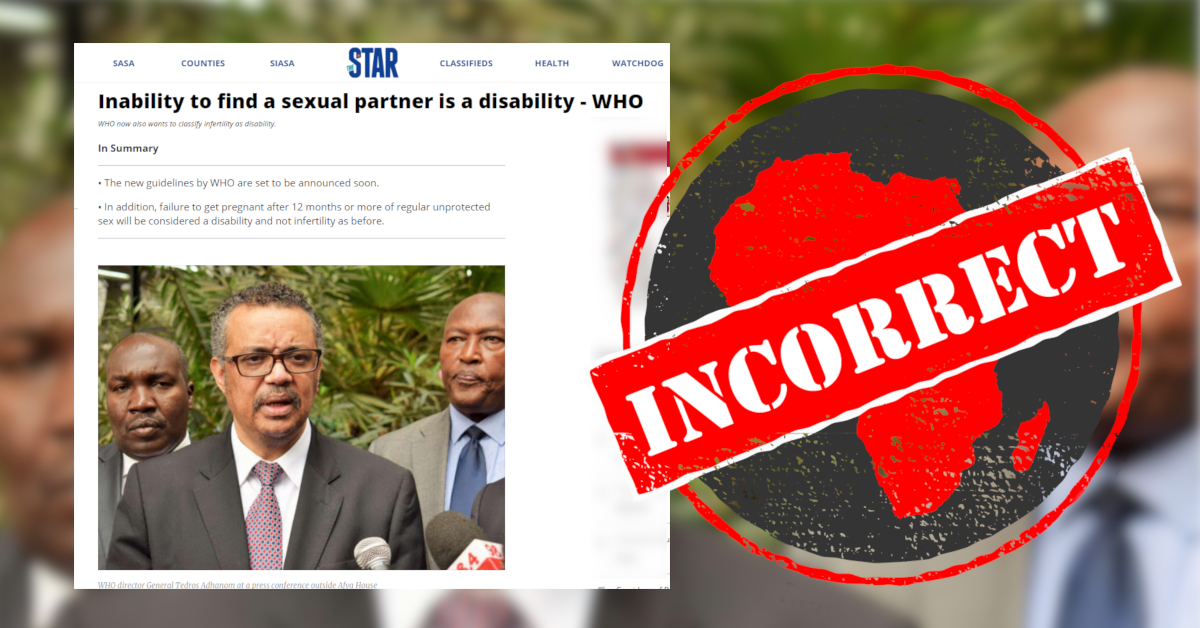“Inability to find a sexual partner is a disability – WHO”, reads the headline to an article in the Star, a Kenyan news site.
The article claims the World Health Organization is considering “new guidelines” to classify “any person who is unable to find a suitable sexual partner or get pregnant after 12 months or more of regular unprotected sex as disabled”.
Is this true? We checked.

The Star’s article is dated 8 June 2019. But the claim first appeared in a 2016 story by the UK’s Telegraph newspaper.
The Telegraph story says that “the inability to find a suitable sexual partner – or the lack of sexual relationships which could achieve conception – could be considered an equal disability”.
Later on in the article “Dr David Adamson, one of the authors of the new guidelines” is quoted, explaining the supposed change and its legal implications.
Africa Check asked the WHO for comment on the accuracy of the story.
“No, it’s not true,” spokesperson Christian Lindmeier told Africa Check.
An October 2016 statement, issued a day after the Telegraph story was published, said that the WHO had not changed its definition of infertility.
“WHO is not planning to make any changes to the definition of infertility. WHO is currently developing guidelines on the diagnosis and management of infertility. These guidelines will not revise the definition of infertility,” the global health body said.
The fact-checking unit of Agence France Presse, AFP Fact Check, also spoke to the fertility expert, Dr Adamson, who was quoted by the Telegraph.
“I was very clear in stating this was not the accepted WHO definition or policy in 2016. It is not now either. Unfortunately, this fact was not clearly stated in the article,” he told AFP Fact Check.
Similarly, Rudi Eggers, the WHO representative for Kenya, also very clearly said that “WHO does not classify infertility as a disability, since disability is neither simply a biological nor a social phenomenon”. – Grace Gichuhi
The article claims the World Health Organization is considering “new guidelines” to classify “any person who is unable to find a suitable sexual partner or get pregnant after 12 months or more of regular unprotected sex as disabled”.
Is this true? We checked.

Origin of the rumour
The Star’s article is dated 8 June 2019. But the claim first appeared in a 2016 story by the UK’s Telegraph newspaper.
The Telegraph story says that “the inability to find a suitable sexual partner – or the lack of sexual relationships which could achieve conception – could be considered an equal disability”.
Later on in the article “Dr David Adamson, one of the authors of the new guidelines” is quoted, explaining the supposed change and its legal implications.
Africa Check asked the WHO for comment on the accuracy of the story.
“No, it’s not true,” spokesperson Christian Lindmeier told Africa Check.
WHO has not changed its definition of infertility
An October 2016 statement, issued a day after the Telegraph story was published, said that the WHO had not changed its definition of infertility.
“WHO is not planning to make any changes to the definition of infertility. WHO is currently developing guidelines on the diagnosis and management of infertility. These guidelines will not revise the definition of infertility,” the global health body said.
The fact-checking unit of Agence France Presse, AFP Fact Check, also spoke to the fertility expert, Dr Adamson, who was quoted by the Telegraph.
“I was very clear in stating this was not the accepted WHO definition or policy in 2016. It is not now either. Unfortunately, this fact was not clearly stated in the article,” he told AFP Fact Check.
Similarly, Rudi Eggers, the WHO representative for Kenya, also very clearly said that “WHO does not classify infertility as a disability, since disability is neither simply a biological nor a social phenomenon”. – Grace Gichuhi
Republish our content for free
For publishers: what to do if your post is rated false
A fact-checker has rated your Facebook or Instagram post as “false”, “altered”, “partly false” or “missing context”. This could have serious consequences. What do you do?
Click on our guide for the steps you should follow.
Publishers guideAfrica Check teams up with Facebook
Africa Check is a partner in Meta's third-party fact-checking programme to help stop the spread of false information on social media.
The content we rate as “false” will be downgraded on Facebook and Instagram. This means fewer people will see it.
You can also help identify false information on Facebook. This guide explains how.


Add new comment